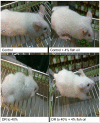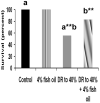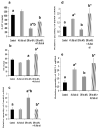Fish oil promotes survival and protects against cognitive decline in severely undernourished mice by normalizing satiety signals
- PMID: 21109417
- PMCID: PMC3117120
- DOI: 10.1016/j.jnutbio.2010.07.001
Fish oil promotes survival and protects against cognitive decline in severely undernourished mice by normalizing satiety signals
Abstract
Severe malnutrition resulting from anorexia nervosa or involuntary starvation leads to low weight, cognitive deficits and increased mortality rates. In the present study, we examined whether fish oil supplementation, compared with that of canola oil, would ameliorate the morbidity and mortality associated with these conditions by normalizing endocannabinoid and monoaminergic systems as well as other systems involved in satiety and cognitive function within the hypothalamus and hippocampus. Female Sabra mice restricted to 40% of their daily food intake exhibited decreased body weight, were sickly in appearance, displayed cognitive deficits and had increased mortality rates. Strikingly, fish oil supplementation that contains high omega-3 fatty acids levels decreased mortality and morbidity, and normalized the expression of genes and neurotransmitters in the hippocampus and hypothalamus. Fish oil supplementation, but not canola oil, increased survival rates, improved general appearance and prevented cognitive decline, despite the facts that both diets contained an equivalent number of calories and that there were no differences in weight between mice maintained on the two diets in 100% but decrease in the 40%. In the hypothalamus, the beneficial effects of fish oil supplementation were related to normalization of the endocannabinoid 2-arachidonylglycerol, serotonin (5-HT) (P<.056), dopamine, neuropeptide Y (NPY) and Ca(2+)/calmodulin (CaM)-dependent protein kinase (Camkk2). In the hippocampus, fish oil supplementation normalized 5-HT, Camkk2, silent mating type information regulation 1 and brain-derived neurotrophic factor. In conclusion, dietary supplements of fish oil, as source of omega-3 fatty acids, may alleviate cognitive impairments associated with severe diet restriction and prolong survival independently of weight gain by normalizing neurochemical systems.
Copyright © 2011 Elsevier Inc. All rights reserved.
Figures








Similar articles
-
Fish oil a source of omega-3 fatty acids affects hypothalamus heat resistance genes expressions and fatty acid composition in heat-stressed chicks.Domest Anim Endocrinol. 2025 Apr;91:106915. doi: 10.1016/j.domaniend.2025.106915. Epub 2025 Jan 14. Domest Anim Endocrinol. 2025. PMID: 39892223
-
Effects of oil source and fish oil addition on ruminal biohydrogenation of fatty acids and conjugated linoleic acid formation in beef steers fed finishing diets.J Anim Sci. 2010 Aug;88(8):2684-91. doi: 10.2527/jas.2009-2375. Epub 2010 Mar 26. J Anim Sci. 2010. PMID: 20348369
-
Mitochondrial Bioenergetics in Brain Following Ozone Exposure in Rats Maintained on Coconut, Fish and Olive Oil-Rich Diets.Int J Mol Sci. 2019 Dec 13;20(24):6303. doi: 10.3390/ijms20246303. Int J Mol Sci. 2019. PMID: 31847143 Free PMC article.
-
Hypothalamic integration of immune function and metabolism.Prog Brain Res. 2006;153:367-405. doi: 10.1016/S0079-6123(06)53022-5. Prog Brain Res. 2006. PMID: 16876587 Free PMC article. Review.
-
Marine Oils.2025 Apr 15. Drugs and Lactation Database (LactMed®) [Internet]. Bethesda (MD): National Institute of Child Health and Human Development; 2006–. 2025 Apr 15. Drugs and Lactation Database (LactMed®) [Internet]. Bethesda (MD): National Institute of Child Health and Human Development; 2006–. PMID: 30000958 Free Books & Documents. Review.
Cited by
-
A moderate diet restriction during pregnancy alters the levels of endocannabinoids and endocannabinoid-related lipids in the hypothalamus, hippocampus and olfactory bulb of rat offspring in a sex-specific manner.PLoS One. 2017 Mar 27;12(3):e0174307. doi: 10.1371/journal.pone.0174307. eCollection 2017. PLoS One. 2017. PMID: 28346523 Free PMC article.
-
Impact of Malnutrition on Physical, Cognitive Function and Mortality among Older Men Living in Veteran Homes by Minimum Data Set: A Prospective Cohort Study in Taiwan.J Nutr Health Aging. 2016 Jan;20(1):41-7. doi: 10.1007/s12603-016-0674-5. J Nutr Health Aging. 2016. PMID: 26728932
-
SIRT1 accelerates the progression of activity-based anorexia.Nat Commun. 2020 Jun 4;11(1):2814. doi: 10.1038/s41467-020-16348-9. Nat Commun. 2020. PMID: 32499508 Free PMC article.
-
Tell me what you eat and I will tell you your sociotype: coping with diabesity.Rambam Maimonides Med J. 2012 Apr 30;3(2):e0010. doi: 10.5041/RMMJ.10077. Print 2012 Apr. Rambam Maimonides Med J. 2012. PMID: 23908834 Free PMC article.
-
Does Short-Term Dietary Omega-3 Fatty Acid Supplementation Influence Brain Hippocampus Gene Expression of Zinc Transporter-3?Int J Mol Sci. 2015 Jul 13;16(7):15800-10. doi: 10.3390/ijms160715800. Int J Mol Sci. 2015. PMID: 26184176 Free PMC article.
References
-
- Ayton AK. Dietary polyunsaturated fatty acids and anorexia nervosa: is there a link? Nutr Neurosci. 2004;7:1–12. - PubMed
-
- Avraham Y, Dagon Y, Magen I, Berry EM. Models of Anorexia. Drug Discovery Today: Disease Models. 2005;2:197–204.
-
- Crawford MA, Hassam AG, Williams G. Essential fatty acids and fetal brain growth. Lancet. 1976;1:452–3. - PubMed
-
- Helland IB, Smith L, Saarem K, Saugstad OD, Drevon CA. Maternal supplementation with very-long-chain n-3 fatty acids during pregnancy and lactation augments children’s IQ at 4 years of age. Pediatrics. 2003;111:39–44. - PubMed
Publication types
MeSH terms
Substances
Grants and funding
LinkOut - more resources
Full Text Sources
Other Literature Sources
Medical
Miscellaneous

